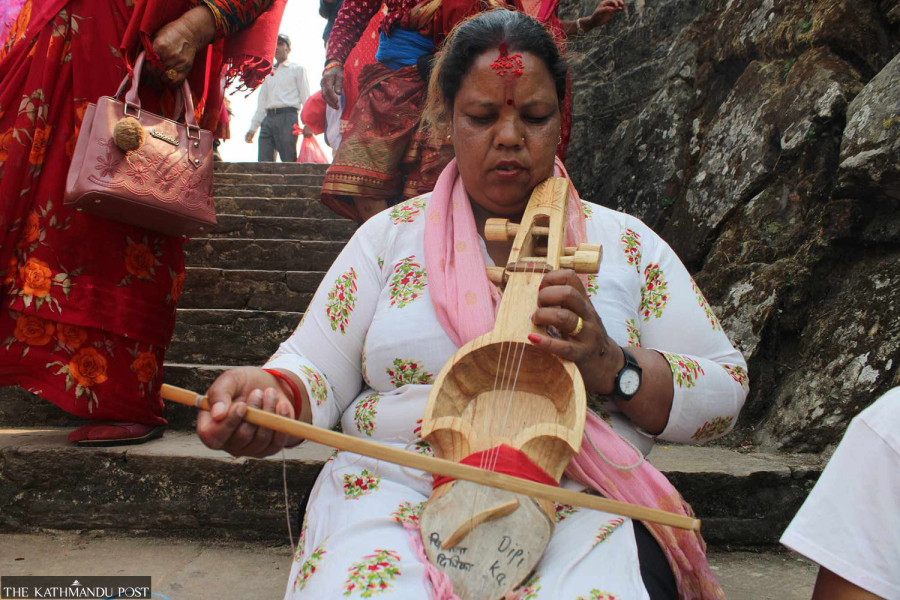Culture & Lifestyle
Sarangi’s ‘Guruaama’
Bhagawati Gandharva has taught eight women how to play this traditional instrument.
Hariram Upreti
Bhagawati Gandharva, with a sarangi resting on her right shoulder, scanned the crowd to perform at the Gorkha Durbar premises. Among six members of the Gandharva community playing the sarangi for devotees at Gorkha Durbar during the Gandhari festival, Bhagawati was the sole woman.
The 42-year-old from Dharapani, Gorkha Municipality–7, is the sole woman in the region who roams villages and markets playing sarangi during the festival and in her spare time. Locals gather to hear the melodies she plays. Inspired by her, eight women are now learning the art.
“The profession of playing the sarangi is disappearing. Women, too, should take the lead in preserving it,” she says. “I’m passing on what I know to my sisters.” Bhagawati, a ‘guruaama’ of sarangi, finds joy in walking from village to village with her instrument.
“I’ve wandered through many settlements in Gorkha playing sarangi, and even travelled as far as Dhading and Kathmandu to sing and perform,” she says. “Once you know how to play, your heart won’t let you stop.”
Bhagawati started learning the instrument in grade 8. Originally from Kohudhovadi, Palpa, her father and grandfather travelled from village to village playing the sarangi. When they returned home, Bhagawati was asked to put away the sarangi.
“On school holidays, I would accompany my father. He didn’t explicitly teach me, but I watched his fingers closely, how placing them differently produced different tunes. That’s how I learned to play. Now I can play on any scale,” she says.
She mostly plays songs based on stories. On a good day, she said, she can earn up to Rs2,500.
“This is like any other business. If there are people, you make around Rs2,500. If not, you make do with Rs200 to Rs500,” she says. Her husband, Ram Bahadur Gandharva, has played the sarangi for nearly four decades.
“I couldn’t leave the house while raising our three sons,” Bhagawati said. “Now that they’ve grown up, we, the old couple, finally have time to travel and perform.” Economic necessity also pushed her to keep performing.
“We didn’t have other jobs, and we had to educate the children,” she says. “When travelling through villages, we receive rice, vegetables, and money. That’s how we’ve managed to sustain our family of five.”
She shared that people are often surprised to see a woman playing the sarangi.
“I’ve never seen another woman playing like this,” she says. “People are amazed when they see me do it.” She believes women can do any work just like men.
“This is our ancestral profession. We must preserve it,” she says. “I often felt that other women should learn it too. For the past two months, 7 to 8 women have been learning to play the sarangi with me.” She teaches women in her neighbourhood how to play the basic “sa-re-ga-ma” notes on the sarangi.
“Our traditional profession is fading. There’s no shame in learning it,” she says.
Her husband, Ram Bahadur, has also made sarangi his main occupation. The couple also teach their sons, Matrid and Dipesh, to play together. Ram Bahadur travels to Gorkha, Lamjung, Dhading, and Kathmandu to perform with his sarangi.
“I don’t feel like giving up this craft,” he says. “Besides, if we don’t play sarangi, how will we feed our family? Our family of five, three sons, my wife, and I, have all been sustained by this sarangi.”
However, Ram Bahadur admits that wandering to play the sarangi means not always being able to eat or rest when needed. “People sometimes say, ‘You have hands and feet, can’t you work instead of begging?’ That hurts,” he admits.




 9.7°C Kathmandu
9.7°C Kathmandu.jpg)

.jpg&w=200&height=120)













